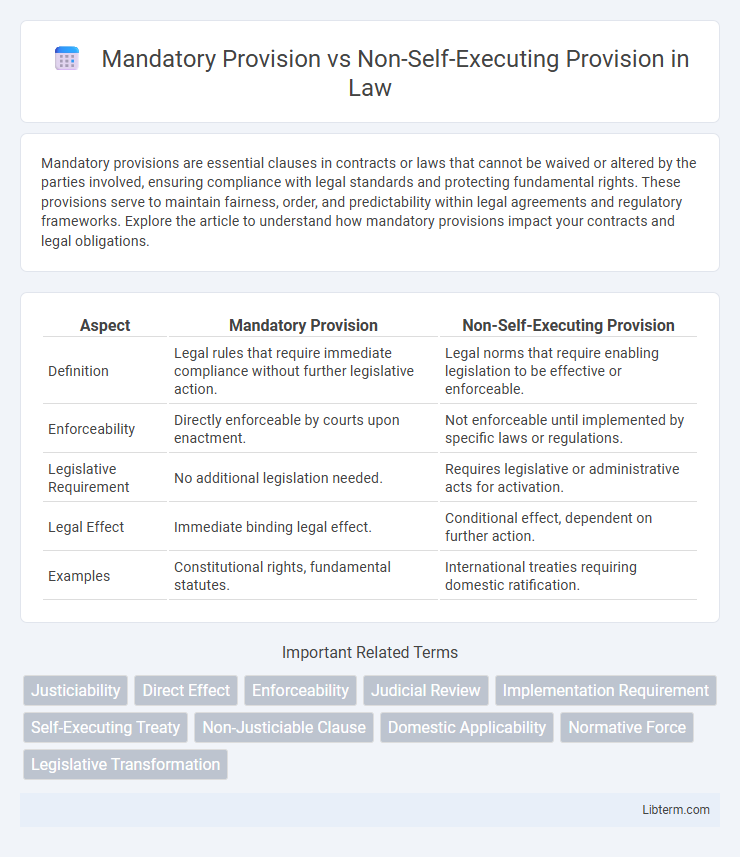Mandatory provisions are essential clauses in contracts or laws that cannot be waived or altered by the parties involved, ensuring compliance with legal standards and protecting fundamental rights. These provisions serve to maintain fairness, order, and predictability within legal agreements and regulatory frameworks. Explore the article to understand how mandatory provisions impact your contracts and legal obligations.
Table of Comparison
| Aspect | Mandatory Provision | Non-Self-Executing Provision |
|---|---|---|
| Definition | Legal rules that require immediate compliance without further legislative action. | Legal norms that require enabling legislation to be effective or enforceable. |
| Enforceability | Directly enforceable by courts upon enactment. | Not enforceable until implemented by specific laws or regulations. |
| Legislative Requirement | No additional legislation needed. | Requires legislative or administrative acts for activation. |
| Legal Effect | Immediate binding legal effect. | Conditional effect, dependent on further action. |
| Examples | Constitutional rights, fundamental statutes. | International treaties requiring domestic ratification. |
Understanding Mandatory Provisions
Mandatory provisions are legal clauses that require immediate implementation without the need for additional legislative action, ensuring direct applicability and enforceability in judicial proceedings. These provisions differ from non-self-executing provisions, which depend on further legislative measures to become operative and enforceable. Understanding mandatory provisions is essential for interpreting laws accurately, as they obligate compliance upon enactment, providing clear, binding directives within a legal framework.
What are Non-Self-Executing Provisions?
Non-self-executing provisions are legal clauses within treaties or statutes that require additional legislative action before becoming enforceable. These provisions do not automatically confer rights or obligations upon ratification but depend on domestic laws to implement their terms. Courts typically cannot directly apply non-self-executing provisions without corresponding national legislation.
Key Differences Between Mandatory and Non-Self-Executing Provisions
Mandatory provisions require direct compliance and have immediate legal effect without further action, while non-self-executing provisions need additional legislation or action to become enforceable. The key difference lies in their operational nature: mandatory provisions impose clear, binding obligations, whereas non-self-executing provisions outline intentions or goals pending formal implementation. Understanding this distinction is crucial for interpreting legal instruments and evaluating their enforceability within judicial or legislative frameworks.
Legal Definitions and Frameworks
Mandatory provisions are legal rules explicitly required by law or regulation, establishing clear duties enforceable by courts, whereas non-self-executing provisions require additional legislative or regulatory action to become enforceable. In constitutional and international law, mandatory provisions directly impose obligations on states or individuals without needing further implementation, while non-self-executing provisions serve as guiding principles or policy goals pending detailed enactment. Legal frameworks differentiate these categories to clarify the immediate applicability of statutes, ensuring proper interpretation and enforcement within judicial systems.
Examples of Mandatory Provisions in Legislation
Mandatory provisions in legislation require immediate and direct application without the need for further implementation by authorities, such as minimum wage laws, anti-discrimination statutes, and safety regulations in the workplace. These provisions impose clear obligations on parties and often include penalties for non-compliance, ensuring enforceability through courts or administrative bodies. Non-self-executing provisions, in contrast, require additional legislative or regulatory action before they produce legal effects, often seen in constitutional clauses needing implementing laws.
Case Studies on Non-Self-Executing Provisions
Non-self-executing provisions require domestic legislation to be implemented effectively, as seen in landmark case studies such as *Medellin v. Texas*, where the U.S. Supreme Court ruled that certain treaty obligations were not automatically enforceable without congressional action. These cases highlight complexities in international law compliance and the interplay between national sovereignty and treaty obligations. Understanding these distinctions is crucial for legal practitioners navigating treaty enforcement and constitutional law.
Judicial Interpretation and Enforcement
Mandatory provisions require direct judicial application and immediate enforcement upon violation, compelling courts to uphold such norms without additional legislation. Non-self-executing provisions necessitate implementing legislation for judicial interpretation and enforcement, limiting courts' ability to enforce these provisions independently. The distinction critically influences how courts interpret constitutional or statutory texts, affecting the scope and timing of judicial remedies.
Impact on Legal Compliance and Governance
Mandatory provisions impose binding legal obligations that directly influence compliance frameworks and governance structures by requiring immediate adoption and enforcement within legal systems. Non-self-executing provisions necessitate additional legislative or regulatory actions before they can affect legal compliance, often resulting in delayed implementation and variable governance outcomes depending on state or institutional responsiveness. The distinction significantly impacts the predictability and uniformity of legal obligations, shaping how entities align policies and operational practices with overarching legal mandates.
Practical Implications for Policymakers
Mandatory provisions require direct compliance by policymakers, leaving no room for discretion in implementation, ensuring immediate legal effect within the jurisdiction. Non-self-executing provisions necessitate additional legislative or regulatory measures before they can be enforced, creating a time gap that policymakers must manage to fulfill international obligations effectively. Understanding these distinctions is critical for policymakers to align domestic law with international agreements and prevent legal ambiguities or compliance delays.
Conclusion: Choosing the Right Provision Type
Selecting between mandatory provisions and non-self-executing provisions depends on the desired legal effect and enforcement mechanisms within a jurisdiction. Mandatory provisions impose immediate legal obligations requiring direct compliance, while non-self-executing provisions serve as policy guidelines needing legislative action for implementation. Determining the appropriate provision type ensures clarity in legal frameworks and effective governance by balancing enforceability and legislative flexibility.
Mandatory Provision Infographic

 libterm.com
libterm.com